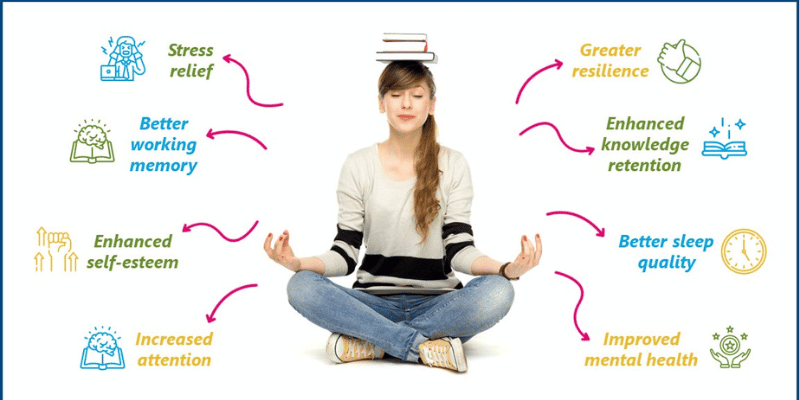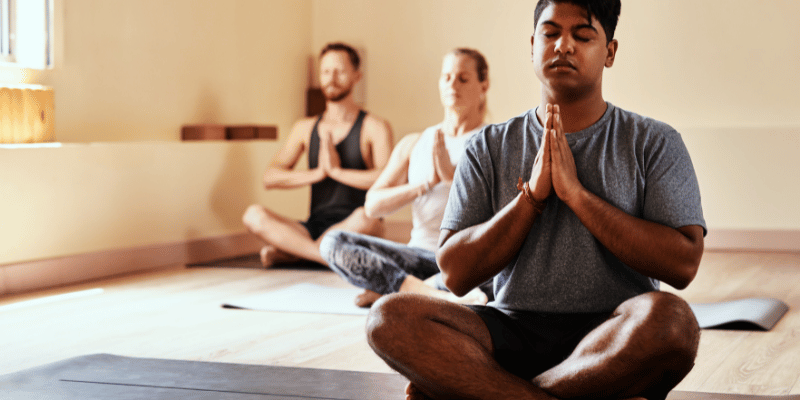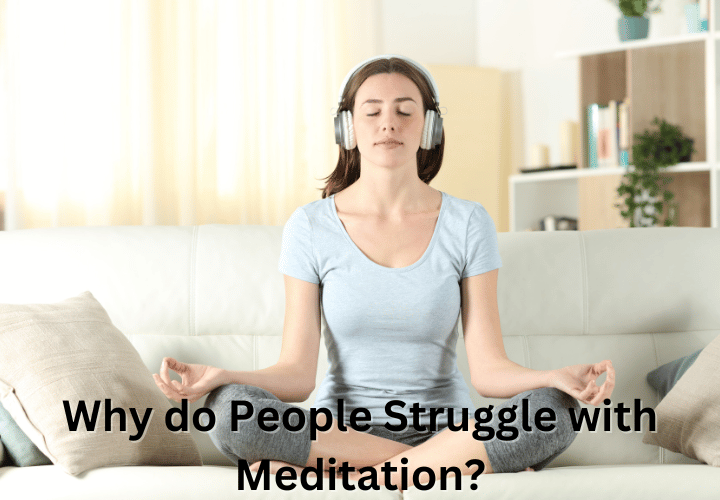Meditation comes with a big bag of rewards. However, you may have asked ‘why do I struggle to meditate?’ A lot of things could be responsible. Maybe you are not doing it with a guide, or you’re meditating for too long or you are not regular. Whatever the reason is, this article aims to give helpful suggestions on how to make the most out of it.
Why do I Struggle to Meditate?

Inability to determine your goals or outcome, inconsistency, lack of finding a particular routine, or trying to empty your mind of thoughts could be some reasons why you can’t meditate. Stress and distraction could be contributing factors to why you’re struggling with meditation.
Overcoming Common Struggles with Your Meditation Practice
According to a 2021 survey, the top 3 obstacles to meditation were impatience (32%), lack of discipline (29%), and an inability to quiet the mind (27%).
70% of new meditators give up within 2 weeks because they expect immediate results. Only 27% of people who try to meditate do it daily according to a Johns Hopkins study.
Wandering during meditation is normal – studies show upwards of 30 thoughts per minute. This is often experienced in women who multitask and encounter a wide range of emotions.
The following will explain how these struggles can be tackled.
Building Patience when Meditation Isn’t Instantly Relaxing

Indeed, the practice of meditation takes patience. It may not work out well the first time since it is new but that doesn’t mean you shouldn’t give it a try. Don’t feel disappointed. Instead of looking for reasons to quit, identify what could be the challenge for you and do your utmost to address them.
Making Meditation a Consistent Habit
Developing a consistent practice will help you overcome the struggle of meditation. Start meditating at a particular time each day. If you are a new meditator, don’t burden yourself with different meditation techniques. Instead, keep things simple. You could also incorporate it into one of your already-established habits every day. For instance, if you brush your teeth in the morning, you can decide to engage in the practice before or after brushing.
Quieting your Overactive Mind
“I don’t have time to meditate” is often mentioned among those who are busy. They worry too much and are thinking of too many times at a time. Meditation can help if you are trying to quiet your mind. Practicing meditation can alleviate stress and anxiety and direct your focus on the present moment.
You need to be spiritual to meditate. This is supported by AiR Atman Ravi who says that meditation is a spiritual practice that affects the body and spirit and helps one reach deeper states of consciousness. This is not new, since meditation has been used in religious contexts in ancient times.
Why Harvard Says Mindfulness is a “Must Have” for Business Executives (And Everyone Else!)
One of the benefits cited is that it supports a healthy brain. This enables business executives to make good business decisions and effectively manage toxic stress. Harvard talked about the parts of the brain that are responsible for self-regulation and self-awareness. These parts are also positively affected by mindfulness. As a result, business executives are able to avoid distractions and develop resilience to stress.
Tips for a Successful Meditation Practice

Now, let’s dive into a few tips to stop you from asking, ‘Why do I struggle to meditate?’ and to successfully make meditation a regular practice.
Try 5 – 10 minute guided meditations to start.
Long meditation could be a common challenge, especially for beginners. Aiming for shorter sessions is considered a great starting point. It will make adjusting to a longer period of time happen easily. Endeavor to practice visualization – the process of using guided imagery to feel or “see” something. Visualizing the mind keeps you focused.
82% of beginners prefer guided vs. silent meditation
Silent meditation is a form of meditation where you are by yourself without disturbance. Some persons though realize that when they do that, their mind starts to wander. So they go for guided ones. Guided meditation is an effective meditation and one of the easiest ways to practice. In this process, you let yourself be guided using audio or video narration. You could make good use of meditation apps or podcasts. Some people even listen to music.
Use noise-cancelling headphones, meditate in nature, or find a quiet room.
It’s quite difficult to meditate when the room is messy and dirty. Free up space in order to feel comfortable. You may want to find a plant to put by your side or sit still by the window in order to achieve a state of relaxation. Avoid distractions by wearing headphones in other to get energy and focus.
Acknowledge thoughts and return focus to your breath.
Completely emptying your mind of thoughts is one of the misconceptions about meditation. But it is not. Just acknowledge them and let them go and maybe tell yourself to look into them later. You can simply say “thought” or “thinking” whenever they rise and try to focus your mind on your breath again. Saying words like “in” when you inhale and “out” when you exhale can help bring your mind back to your breath.
How to Quiet Your Mind in Meditation

It’s difficult to focus when you have a very busy mind. Anxiety and stress often result from this. Meditation will help you reduce such stress. Mindfulness is the point of meditation where you are able to bring your mind to focus. And it’s quite natural and easy to do so:
Short, Guided Meditation Sessions
Self-meditation may not help you reach your full potential. Longer sessions may not help either. Make them short and gradually increase the time. Use guided apps like Calm or Headspace. These apps are helpful to calm the pressure, relax your nerves, and bring your mind to the present whenever they wander.
Minimizing Distractions
Your environment can have a great effect on your mind. There are some background noises that are termed unpleasant and may hinder your ability to be calm. Choose a quiet and comfortable place free from unwanted noises. Do not keep your phone or any device near you except when you are using it to achieve guided meditation.
Observing Thoughts without Judgment
Do not be quick to expel thoughts that come to your head. It is normal for these to pop up here and there. If you quickly judge yourself for having these, you may quickly give up without reaching your goals. Instead of quickly flushing them out when they come, simply notice them and let them go. Bring your mind back to meditation and continue your journey. This will help improve your meditation skills.
The Benefits of a Regular Meditation Practice

Meditation is an ancient practice that has proven to have a positive effect on people. Benefits include reduced stress. The benefits of meditation also include mental and physical benefits such as regulating blood pressure and achieving resilience. You will also enjoy the benefits of reduced depression. These are explained extensively below.
Physical Benefits

According to a study conducted in 2018, students who used meditation apps like Headspace for just 10 days experienced a 12% decrease in stress. Those who used it for up to 30 days were able to lower their stress hormones by a third.
To help appreciate the effect of mediation on one’s mental and physical health, think, for example, of cortisol. It is a stress hormone in the body that poses no problem when it is at a normal level. But high level of stress increases the level of cortisol and that is where the problem lies. You may begin to have decreased immunity, high blood pressure, and high sugar levels. Meditation helps to calm your mind and make the cortisol levels normal again. As a result, stress levels are managed, your immune system is stronger and your blood pressure is regulated.
Reduced stress is also linked to the lowering of heart and oxygen rates and improved sleep.
Mental Health Benefits
Meditation can help with immense mental health benefits such as increasing focus and mental clarity. It can also help you in becoming aware of yourself and your environment. A study conducted showed that using apps like Headspace for 4 weeks can increase focus by 14%. Another study showed that just a single session of mediation can cut mind-wandering by 22%.
Meditation can also help reduce anxiety and depression. Research conducted at Google showed that employees who used Headspace for 8 weeks had a 46% and 31% reduction in depression and anxiety respectively.
Meditation helps improve one’s mental state by developing resilience to stress. This is shown in a study conducted where Headspace was used for 30 days. It was found that there was an increase in mental resilience by 11%.
Emotional Benefits
Meditation can help make your emotional state stable and change your mindset from a negative one to a positive one. Research has shown that the ability to regulate emotions and to make well-informed decision increase over time with regular mediation practice. Meditation may help deal with stress, fear, anxiety, aggression, and other negative feelings.
In particular, research conducted by willing participants, it was discovered that those who meditated for about 3 weeks had a 57% reduction in aggression. A 10-day meditation session decreased participants’ irritability by 27%. It was also discovered that it helped to increase positive emotion and compassion by 16% and 21% respectively.
Making Meditation Part of Your Routine

A trick to keep up with meditation is to make it a normal part of life just as you brush, bathe, and eat. So before or after you do your morning chores or evening chores, you can add meditation as part of your normal routine so you can easily attend to it. But do you still find meditation a struggle? Then you can try the following meditation instructions:
Setting a Consistent Time
We’re not talking about a random time. Set aside time and be consistent with it. It could be in the morning or evening but try to get yourself practicing it at the same time every day. When you have an established time for it, it will be easier to engage in it.
Starting Small
Doing too much is one of the reasons that people give up when it comes to their struggle with meditation. The truth is, hopping into it with the mind of staying for longer periods can set you up for discouragement. As earlier mentioned, start with shorter sessions, maybe two to five minutes. As time progresses, you can increase the length and make it part of you.
Creating Reminders
Creating reminders can help you build long-lasting habits. You can schedule the time of the day you want to meditate using your Google Calendar, Microsoft Outlook, or any other device that you think can be of help of constantly bringing it to your mind that you need to do this.
How to make Meditation a Daily Habit
Truthfully speaking, there are lots of distractions that could discourage you or weaken your resolve to concentrate. There could be external or internal ones like the ones in your mind. Even if we have mapped out a desired time, we may struggle with it. We may feel less interested, bored, or think we are doing it the wrong way especially if our high expectations are not met. These feelings are normal. However, there are a few tips to help build a daily routine for your mediation practice.
Changing your Relationship to Thoughts with Meditation

Thoughts are not the enemy. In fact, you will find that meditation is not complete without thoughts. Learning to treat these in a friendly way is important. It is not going to happen overnight so do not rush yourself. Be patient and you will be able to change your relationship to thoughts.
Letting go of Expectations
One of the barriers to meditation is expecting too much. Some expect immediate results and when they do not get it, they either think they are not doing it well, or they are not the kind of person that can meditate and so they abandon the course altogether. It is best to approach this practice with the mindset of experimenting with things or trying out new things. Do not quickly judge or criticize the outcome of what you are doing. Meditation is about letting go of your expected reward.
Practicing Acceptance
When thoughts come to your head, don’t be quick to judge or criticize them. Accept them without evaluating them and then let them pass. It will help you treat yourself with kindness and develop appreciation. Meditation can improve your relationship with yourself and lead to self-acceptance.
Focusing on Consistency over Perfection
Perhaps the reason why you keep asking yourself ‘Why do I struggle to meditate?’ is because your aim is to reach perfection. Meditation is not perfection, it is a practice. Aim for consistency. Meditating regularly will help you make long-lasting improvements and achieve happiness.
Faqs:
- Why am I so uncomfortable with meditation?
You may feel uncomfortable because you are expecting too much from meditation. Let go of those expectations and simply enjoy the journey.
- Why can’t I relax during meditation?
Perhaps you’re greatly stressed or are multitasking and as such, your mind is filled with so many struggles. Check out tips on how to achieve a quiet mind in this article.
- Can meditation be harmful?
According to research that has been undergone, too much meditation can increase your level of anxiety and depression and the occurrence of negative flashbacks.
- How can I find the perfect meditation technique for me?
There is no best-recommended meditation or meditative technique that is perfect for someone. You can explore the different types of meditation – mindfulness meditation, walking meditation or loving-kindness meditation and regularly practice the one that is suitable for you.
- How do you model mindfulness for your children?
You can do that by teaching them to express gratitude every day. You can take them out for nature walks and create a bedtime routine for them. It is not a bad thing to tell them to practice meditation by watching you meditate.
- Is it normal to feel sleepy during meditation?
It is normal to feel sleepy or drowsy during meditation. It happens when you need rest or you’ve had a rough day. But don’t make it a habit.
- Why is meditation so hard?
One reason why people say meditation is hard is the distraction and noise that come up whenever they try to settle down or the inability to focus. Try to minimize distractions and make your space comfortable.



